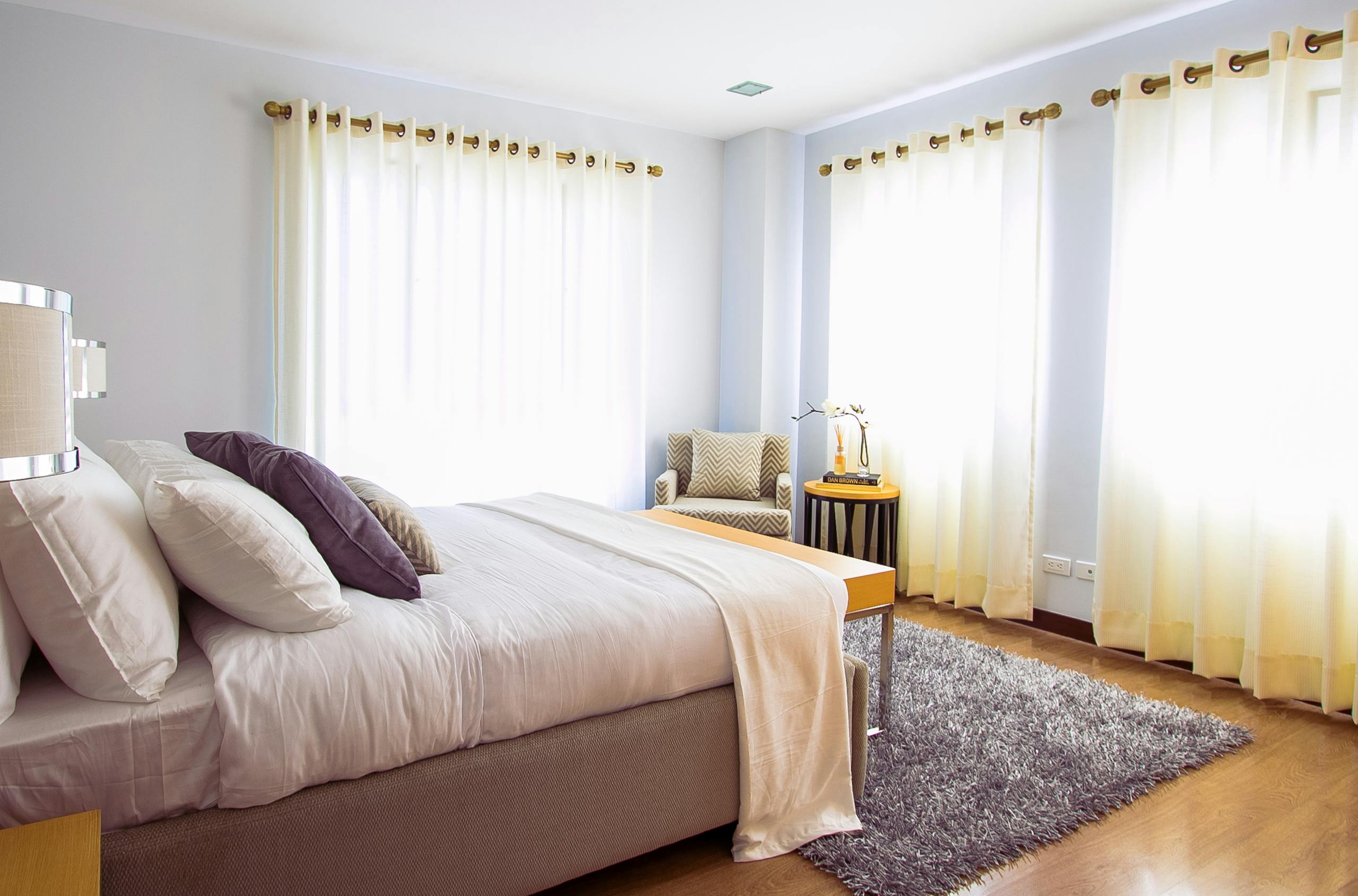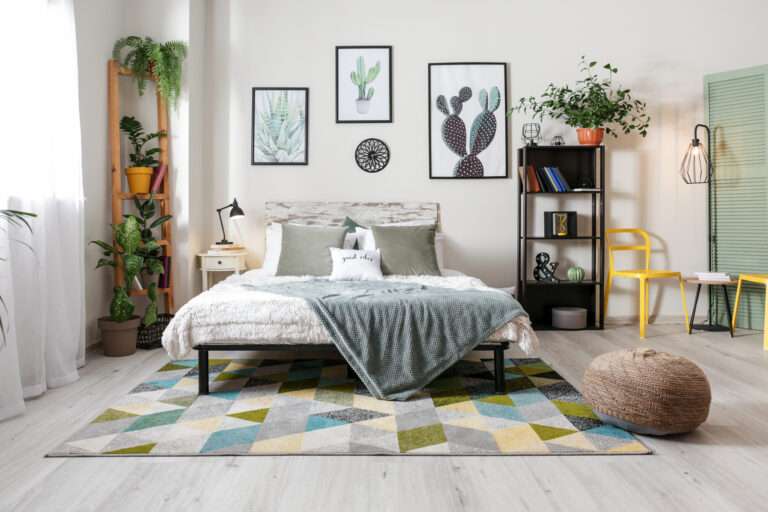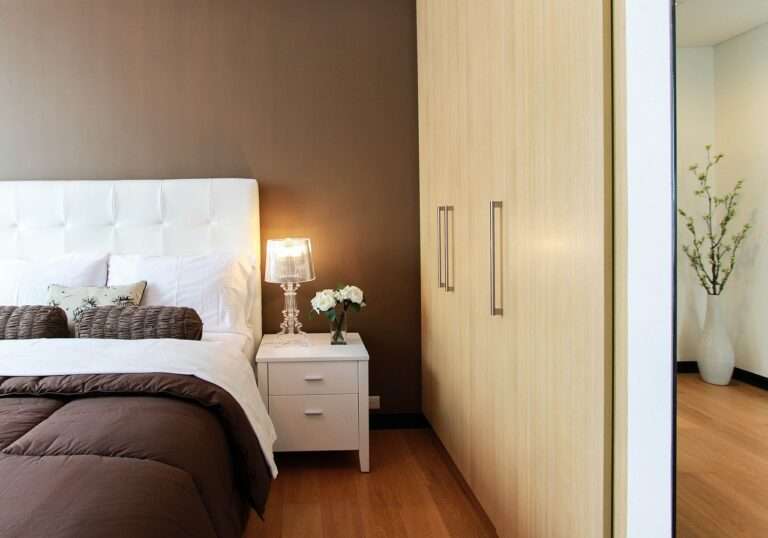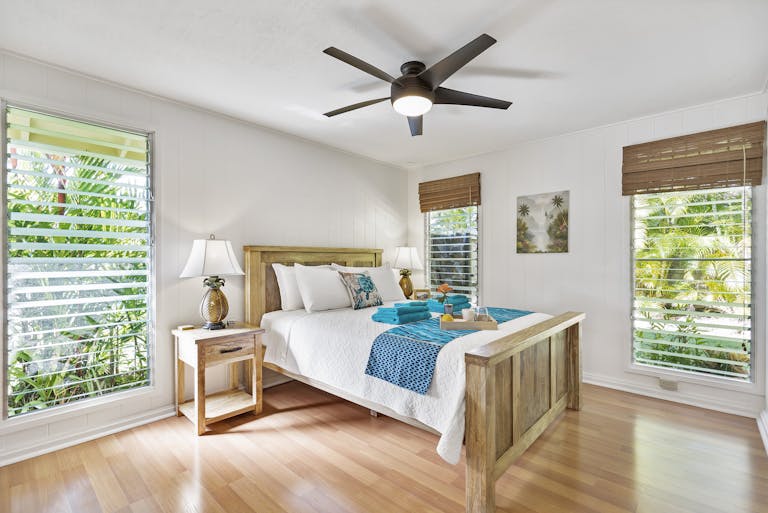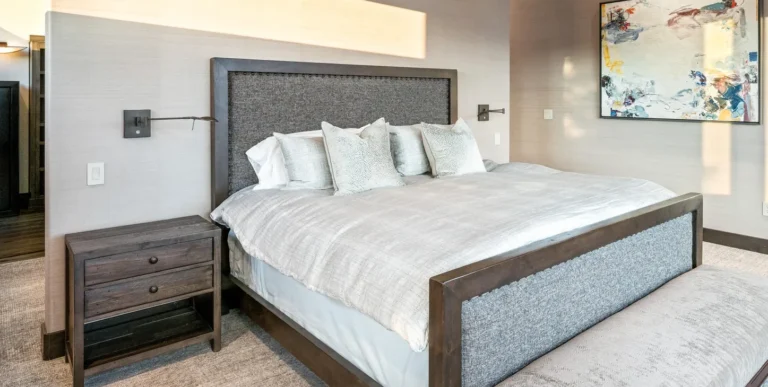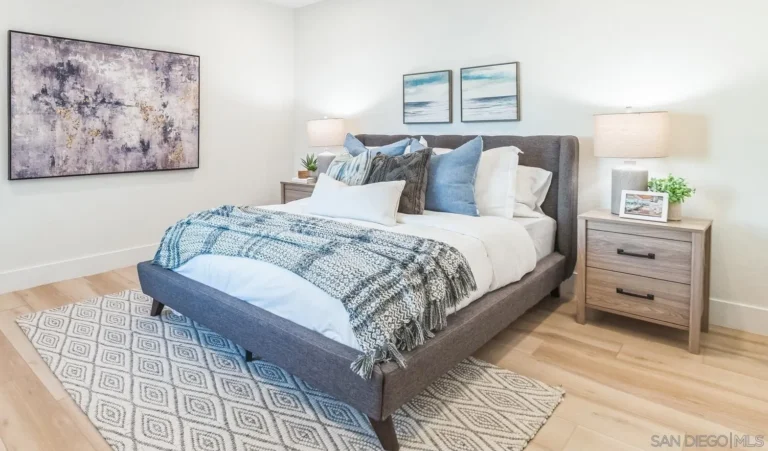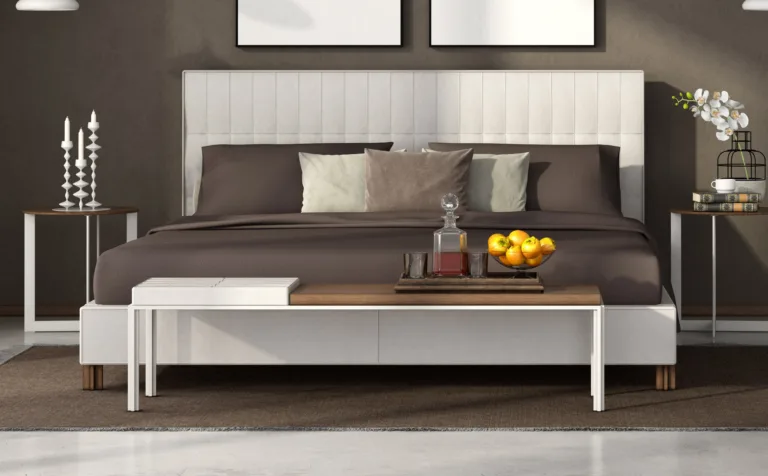How to Organize a Bedroom for Better Sleep
How to Organize a Bedroom for Better Sleep: 12 Expert Solutions for 2024
Discover 12 expert solutions to organize a bedroom for better sleep. Learn how decluttering, lighting, and color choices can improve your rest in 2024.
Did you know that the way your bedroom is organized can have a huge impact on how well you sleep? It’s true! Sometimes, people think the only way to sleep better is to go to bed earlier or get more rest, but your environment plays a huge role too. Clutter, lighting, colors, and even your bedding can make it hard for you to fall asleep or get a good night’s rest.
If you’ve been waking up feeling tired, it might be time to change how your bedroom is organized. With just a few simple tweaks, you can turn your bedroom into a peaceful place where you can truly relax and sleep soundly.
In this guide, we’ll cover 12 expert tips on how to organize your bedroom for better sleep. From clearing clutter to choosing the right bedding and making your bedroom darker and cooler, these ideas will help you create the perfect space to rest and recharge.
1. How to Arrange a Bedroom for a Calming Atmosphere
One of the first steps to organize a bedroom is to declutter it. A messy bedroom doesn’t just look disorganized; it can also lead to feelings of stress and overwhelm. When your eyes land on clutter, your brain becomes overstimulated, making it harder to unwind and prepare for sleep.
To declutter your space:
- Start by clearing off surfaces like nightstands, dressers, and the floor.
- Remove anything you don’t need or use regularly.
- Use storage bins, baskets, or drawers to store items out of sight.
- Keep only a few important things on display, like a lamp or a book you’re reading.
A clean and tidy bedroom makes it easier to relax. When your space is clutter-free, your mind can focus on rest, and you’ll find it easier to drift off to sleep.
2. Invest in Blackout Curtains
Even a little bit of light coming into your room at night can mess with your sleep cycle. Light tells your brain it’s time to wake up, even if it’s still night outside. If you have street lights shining in or if the sun comes up early, blackout curtains can help.
Blackout curtains are thick, dark curtains that block light from entering your room. Here’s why they’re so helpful:
- They keep out street lights, car headlights, and early morning sunshine.
- They also help with sound insulation, which is great if you live in a noisy area.
- Blackout curtains can even keep your room cooler by blocking out sunlight during the day.
With blackout curtains, you can create a pitch-black room that signals to your body that it’s time to sleep, helping you fall asleep faster and stay asleep longer.
3. Choose Soothing Colors for Your Bedroom
Believe it or not, the colors in your room can either help you relax or make you feel more awake. Bright colors like red, orange, or neon shades can make you feel energetic, which isn’t great when you’re trying to wind down for the night.
For a bedroom that helps you sleep, choose soft, calming colors like:
- Pale blues
- Soft greens
- Lavender or light purples
- Beige, cream, or other light neutrals
These colors are gentle and relaxing, which helps your mind feel calm and ready for bed. Avoid bright, bold colors that might make your brain feel too stimulated when you’re trying to relax.
4. Optimize Bedroom Lighting for Better Sleep
The lighting in your bedroom can have a big effect on how easily you fall asleep. Harsh or bright lights can keep you feeling awake, while soft, dim lighting helps your body get ready for sleep.
Here are some tips for better lighting:
- Use dimmable lights so you can lower the brightness as bedtime approaches.
- Choose warm-toned bulbs with a soft glow rather than cool-toned, white lights.
- Place soft bedside lamps by your bed so you can read or relax without the need for bright overhead lighting.
By creating a cozy, dimly lit space in the evening, your brain gets the signal that it’s time to relax, making it easier to drift off to sleep.
5. Keep Your Bedding Clean and Comfortable
Your bedding plays a huge role in how well you sleep. If your sheets or blankets are uncomfortable or too warm, it’s harder to relax and stay asleep through the night.
For a good night’s sleep:
- Invest in high-quality sheets made from breathable materials like cotton or linen. These fabrics help regulate your body temperature.
- Wash your bedding regularly to keep it fresh and clean. Fresh sheets feel good and can even help you fall asleep faster.
- Switch out your bedding seasonally. Use lighter blankets in the summer and heavier ones in the winter.
A clean and cozy bed feels inviting, making it easier to settle in and get a full night of rest.
6. Create a Tech-Free Zone in Your Bedroom
One of the biggest reasons people have trouble falling asleep is the use of technology before bed. Phones, TVs, and tablets all emit blue light, which can make your brain think it’s still daytime. This blue light stops your body from making melatonin, the hormone that helps you sleep.
To create a tech-free zone in your bedroom:
- Keep your phone, tablet, or other electronics outside of the bedroom.
- Set up a charging station in another room to keep devices out of your sleep space.
- If you must have your phone nearby, put it on “Do Not Disturb” mode and avoid using it at least 30 minutes before bed.
By keeping technology out of the bedroom, you give your brain a chance to relax and wind down, which makes it easier to fall asleep.
7. Choose the Right Mattress and Pillows
The right mattress and pillows can make a huge difference in how well you sleep. If your mattress is too hard or too soft, or if your pillows don’t give you enough support, you might find yourself waking up sore and tired.
Here’s how to choose the right ones:
- Try out different types of mattresses, like memory foam, hybrid, or innerspring, to find the one that’s most comfortable for you.
- Replace your mattress every 7 to 10 years to ensure it’s still giving you the support you need.
- Use pillows that keep your neck and spine in proper alignment. For side sleepers, thicker pillows are best, while back sleepers might prefer thinner ones.
A comfortable bed that supports your body will help you sleep better and wake up feeling refreshed.
8. Add Greenery for Better Air Quality
Houseplants can do more than just brighten up your bedroom—they can also help purify the air. Plants like snake plants, lavender, and aloe vera can remove toxins from the air and add oxygen, which is great for your health and your sleep.
Here’s how to bring greenery into your bedroom:
- Choose low-maintenance plants that don’t need a lot of care.
- Pick plants that are known for purifying the air, like spider plants, peace lilies, or bamboo palms.
- Make sure the plants you choose are safe for pets if you have any.
Having a few plants in your bedroom can create a more relaxing and refreshing environment, helping you breathe easier and sleep better.
9. Limit Bedroom Décor to Keep it Minimal and Peaceful
It can be tempting to fill your bedroom with decorations, but too much décor can make your space feel busy and cluttered, even if it’s organized. A simple, minimal approach to decorating your bedroom helps keep things peaceful and relaxing.
To keep things simple:
- Choose a few pieces of artwork or photos that make you feel calm and happy.
- Avoid too many mirrors or bright, bold décor that might feel too energetic for a sleep space.
- Use furniture that is simple, elegant, and doesn’t overwhelm the room.
By keeping your décor minimal and peaceful, your bedroom will feel more like a sanctuary where you can relax and unwind.
10. Maintain a Cool Temperature for Optimal Sleep
Your body’s temperature naturally drops when you sleep, so keeping your bedroom cool can help signal to your body that it’s time to rest. If your bedroom is too hot, it can be difficult to fall and stay asleep.
Here’s how to keep your room cool:
- Aim for a room temperature between 60 and 67 degrees Fahrenheit (15 to 19 degrees Celsius).
- Use a fan or air conditioner to maintain a cool temperature, especially in the summer months.
- Choose lighter bedding in warmer weather and heavier bedding in cooler months.
By keeping your room at the right temperature, you’ll be more comfortable and have a better chance of getting a deep, restful sleep.
11. Use Aromatherapy to Promote Relaxation
Certain scents can help your brain relax and prepare for sleep. Lavender, chamomile, and eucalyptus are all known for their calming effects and can make your bedroom feel more like a spa than a regular room.
Here’s how to use aromatherapy:
- Use an essential oil diffuser to fill the room with a relaxing scent.
- Spray your pillow with a lavender or chamomile pillow mist before bed.
- Try using scented candles or bath products with calming scents in your nighttime routine.
Aromatherapy can help create a peaceful, calming environment that signals to your brain that it’s time to rest.
12. Organize a Bedroom: Declutter Your Closet for a Stress-Free Space
A messy, disorganized closet can make your whole bedroom feel chaotic, which adds stress to your daily routine. When you open your closet and see clothes piled up, it can create subconscious stress and make your bedroom feel less restful. An organized closet not only improves the appearance of your space but also helps you start each day on the right foot.
To get your closet in order, start by decluttering:
- Assess Your Wardrobe: Go through your clothes and ask yourself if you’ve worn each item in the past year. If not, consider donating it. This can clear out a lot of space and make choosing outfits easier.
- Sort and Categorize: Organize what you keep by category—grouping like items together, such as shirts, pants, and jackets. This makes it simpler to find what you need when you’re getting dressed.
- Use Storage Solutions: Invest in organizers like shelf dividers, hanging organizers, or bins to keep your closet tidy. Make use of vertical space by stacking or hanging items, allowing you to see everything at a glance.
- Maintain a Clean Closet: Set aside time every few months to reassess your closet. This keeps clutter from building up again and helps maintain a serene environment.
By taking the time to organize your closet, you’ll reduce stress and make your bedroom feel more inviting. A neat and tidy space allows you to focus on relaxation, making it easier to unwind after a long day.
Conclusion
Creating a bedroom that supports restful sleep is more important than you might think. From decluttering to choosing the right colors, lighting, and bedding, every little change can contribute to a peaceful environment. By following these 12 expert solutions, you can transform your bedroom into a sanctuary where relaxation comes easily.
Remember, sleep isn’t just about the quantity of hours you spend in bed; it’s about the quality of that sleep. A well-organized bedroom promotes better sleep hygiene and reduces stress, which are crucial for your overall well-being.
So, take the plunge and implement these strategies in your bedroom. Not only will you likely experience better sleep, but you may also feel more energized and ready to tackle each day. You deserve a sleep-friendly sanctuary that nourishes your body and mind!
By creating a serene environment, you’re investing in your health, mood, and productivity. Start today—your restful nights and brighter days are just a few organizational tweaks away!
